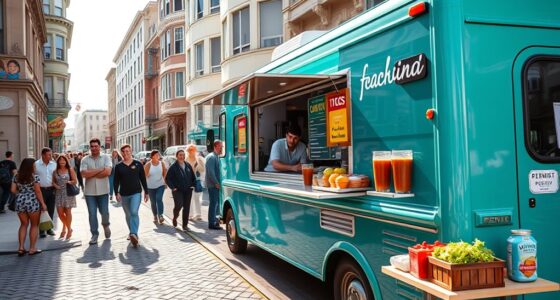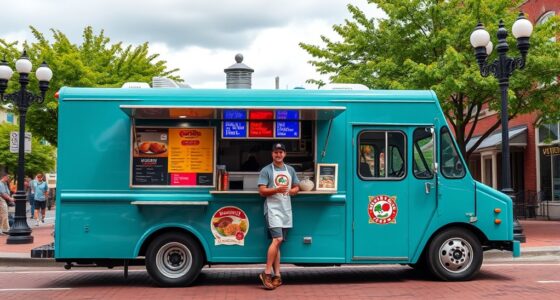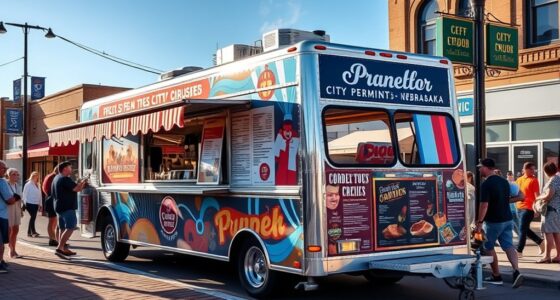To open a food truck in Memphis, you’ll need permits from the Tennessee Department of Health and Shelby County, including a food service license and commissary agreement, and your vehicle must meet strict sanitation and safety standards. Startup costs range from $40,000 to $150,000, with ongoing expenses like food, fuel, and insurance. Strategic locations include downtown and popular events, while menus should reflect local flavors and dietary options. Keep compliance in mind to build a thriving business—explore more tips below.
Key Takeaways
- Obtain necessary permits and licenses from Tennessee and Shelby County health departments, ensuring compliance with health, safety, and fire standards.
- Budget $40,000–$150,000 for truck purchase, plus ongoing costs for inventory, fuel, insurance, and maintenance.
- Identify high-traffic locations and events like downtown, breweries, and festivals, while adhering to Memphis permit zones and restrictions.
- Develop a diverse menu with regional flavors, dietary options, and engaging branding to attract a broad customer base.
- Invest in targeted social media marketing, community partnerships, and loyalty programs to build brand awareness and customer loyalty.
Understanding Local Permitting and Licensing Requirements

To operate a food truck in Memphis or Shelby County, you need to understand and comply with local permitting and licensing requirements. All trucks must follow ordinances related to food prep and operations, especially if connected to utilities like sewer, water, electric, or gas, which can classify your truck as a permanent structure. To obtain approval, you’ll need a Certificate of Occupancy, passing various building, electrical, plumbing, and mechanical inspections. If your truck has covered seating for 50 or more, plans must be sealed by a Tennessee-licensed professional. Additionally, permanent locations require restrooms and backflow prevention. You must submit detailed plans, obtain a business license, and provide notarized lease and waste disposal agreements. Local health departments and the Tennessee Department of Revenue oversee and enforce these licensing standards. Understanding local regulations is crucial to ensure full compliance and avoid potential fines or operational delays.
Estimating Startup and Ongoing Investment Expenses

Estimating the costs to start and keep your food truck running is essential for creating a realistic business plan. Your initial investment will likely include a truck costing between $40,000 and $150,000, depending on size and features. Expect to spend $2,000–$3,000 on inventory, plus around $300 for serveware. Budget $500–$1,000 for fuel and maintenance reserves to ensure smooth operation. Insurance premiums in Tennessee typically range from $800 to $1,200 annually. Ongoing expenses include weekly food ingredients exceeding $1,000, monthly fuel costs of about $600, and disposable supplies. Licensing, permits, and inspection fees will also add to your expenses. Properly appraising these costs helps you plan finances, avoid surprises, and set realistic revenue goals for your Memphis food truck. Understanding local regulations is crucial to ensure compliance and avoid unexpected legal fees. Additionally, considering vehicle maintenance is vital to keep your truck operational and minimize downtime.
Choosing Strategic Operating Locations in Memphis
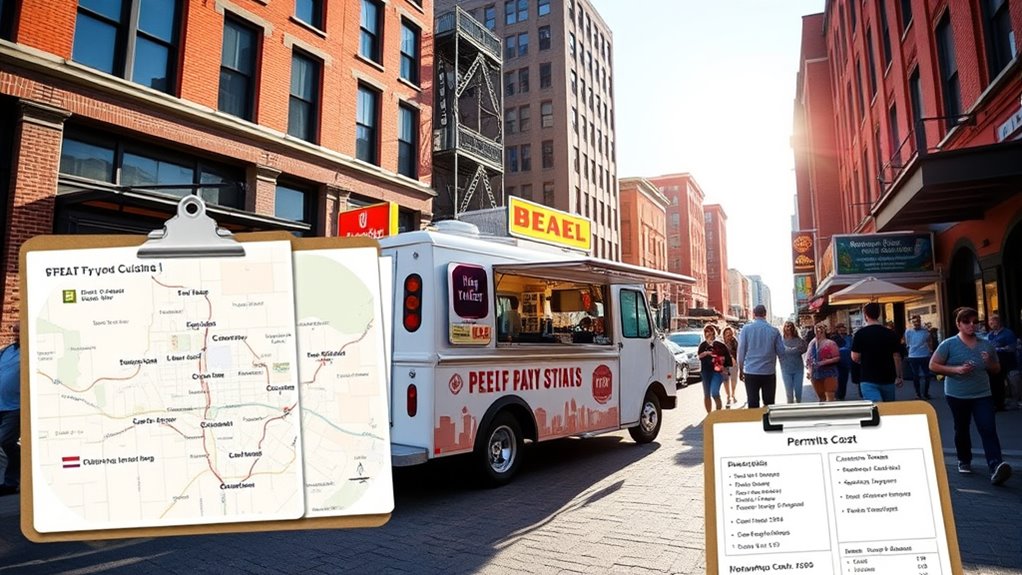
Choosing the right location is key to your food truck’s success in Memphis, but you’ll need to contemplate high traffic zones, event partnerships, and permitting restrictions. High foot traffic areas like downtown and near breweries can boost sales, while participating in events increases visibility. Keep in mind that permits and regulations vary by location, so understanding these rules is essential before setting up shop. Additionally, Memphis hosts numerous food festivals and outdoor markets throughout the year, providing excellent opportunities to reach a wider audience and build your customer base. Food festivals and outdoor markets are a great way to showcase your menu and attract new patrons. Being aware of local regulations can help you navigate the permitting process smoothly and avoid potential fines.
High Traffic Zones
Selecting the right high-traffic locations is essential for maximizing your food truck’s visibility and sales in Memphis. Popular spots like Cordelia’s Market host weekly Food Truck Wednesdays, drawing crowds from spring to summer evenings. Cordova Pitstop Food Truck Park operates daily, with peak hours midday through evening, serving as a hub for food trucks. Court Square in downtown Memphis sees heavy lunchtime traffic on Thursdays, attracting office workers and visitors. Memphis Food Truck Park focuses on breakfast and lunch weekdays, targeting daytime passersby. Medical District Food Truck Fridays draw medical and office staff. Breweries such as Ghost River and Wiseacre host food trucks during events, boosting evening and weekend sales. Locations near busy commercial areas, office parks, or transit stops also increase foot traffic and customer accessibility. The platform’s real-time location updates help food truck operators identify the most profitable spots during different times of the day. Additionally, leveraging strategic location planning can significantly enhance your visibility and sales potential in Memphis.
Event Partnerships
Partnering with local events in Memphis can substantially boost your food truck’s visibility and sales. By joining established gatherings, you gain access to enthusiastic audiences and create valuable connections. Consider these opportunities:
- Submit applications early for popular events like Taste of Memphis, which limit vendor slots and charge fees (e.g., $40). Securing a spot at such well-attended festivals can significantly increase your customer base.
- Collaborate with nonprofit initiatives, such as “The Truck That Gives Back,” to enhance your community reputation.
- Sponsor festivals like Fall Fest Memphis, starting at $200, for branding through signage and social media.
- Participate in neighborhood celebrations that focus on local vendors, fostering loyalty and long-term relationships.
- Monitoring event websites and maintaining communication with organizers guarantees timely participation, maximizing exposure and growth. Staying informed about upcoming events ensures you don’t miss valuable opportunities to grow your business.
Permitting Restrictions
To operate legally in Memphis, you need to navigate specific permitting restrictions that dictate where your food truck can set up. Memphis limits locations to designated Mobile Food Unit Zones, mainly on public property within approved areas. Private property requires explicit owner permission, with additional restrictions near events or markets. You cannot operate in residential districts like R-MP, R-E, or R-15, unless you secure a special use permit. Distance rules also restrict proximity to schools, special events, and farmers markets, especially in the Central Business District. Ensuring compliance with local regulatory frameworks is crucial for a successful food truck operation.
Developing a Menu That Meets Health and Customer Preferences
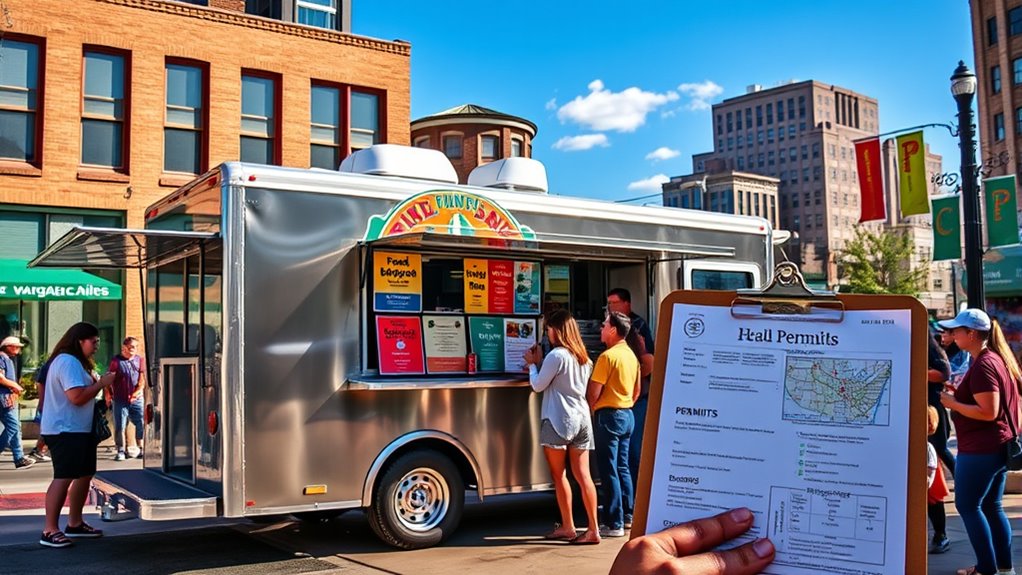
Creating a menu that satisfies both health-conscious and diverse customer preferences requires a strategic approach. Focus on balancing flavor, nutrition, and local tastes to stand out. Consider these key steps:
- Offer options like gluten-free, vegetarian, and vegan dishes to attract a broader audience.
- Use fresh, high-quality ingredients, including seasonal produce, to boost flavor and sustainability.
- Incorporate regional Memphis favorites like BBQ, smoked meats, and comfort foods, adding customizable choices. Incorporating authentic regional flavors can help your menu resonate more deeply with local patrons.
- Clearly label menu items to help customers make informed, healthy choices quickly.
- Memphis’ rich musical and cultural history can inspire menu themes and unique offerings that resonate with both locals and tourists.
Ensuring Compliance With Health and Safety Standards

Ensuring compliance with health and safety standards is essential for operating a food truck legally and safely in Memphis. You must obtain the necessary permits from the Tennessee Department of Health and Shelby County Health Department, including a valid food service license and a commissary agreement for storage and waste disposal. Your vehicle must stay on wheels at all times and meet sanitation standards, with proper sinks, wastewater tanks, and grease traps maintained daily. Fire safety is also critical; your truck needs to pass inspections and have fire suppression systems and extinguishers installed per the International Fire Code. Regular waste disposal, cleaning, and sanitizing are mandatory to prevent contamination and pests. Staying compliant safeguards your business, customers, and community health. Fire safety inspections are an important part of the permit process, ensuring that your truck meets all necessary safety standards before operating. Additionally, understanding health department regulations helps prevent potential violations that could delay your launch.
Building a Marketing Plan to Grow Your Food Truck Business
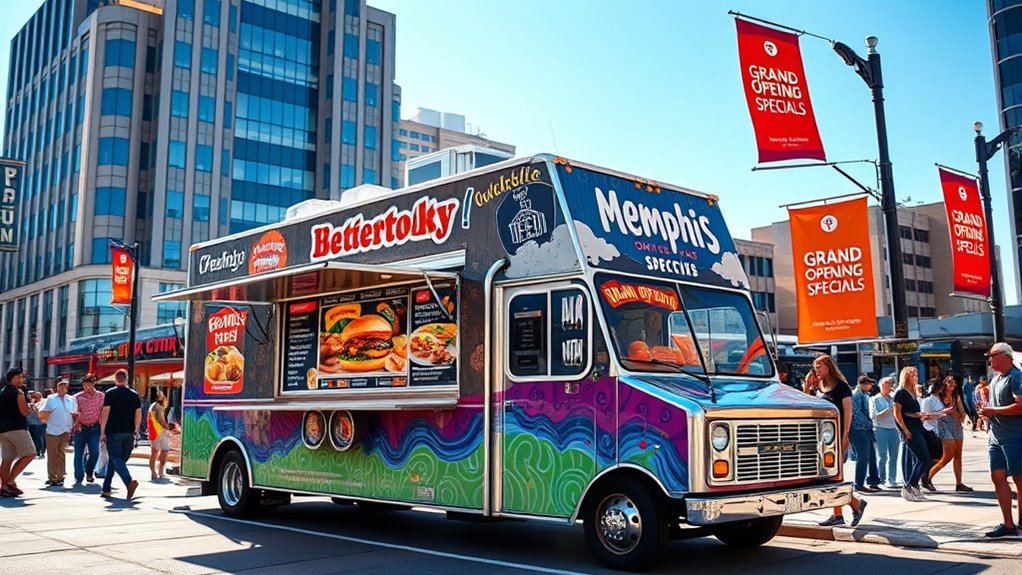
To grow your food truck business in Memphis, you need a strong marketing plan that builds your brand identity and attracts customers. Focus on creating consistent visuals, engaging with your community on social media, and forming local partnerships to boost visibility. By using targeted promotion and loyalty strategies, you’ll turn new visitors into loyal fans. Developing a clear marketing budget—typically 5-10% of your sales—helps ensure your promotional efforts are sustainable and effective. Incorporating effective marketing strategies can significantly enhance your outreach and customer engagement.
Brand Identity Development
Building a strong brand identity is essential for standing out in Memphis’s competitive food truck scene. Your brand should reflect your mission, USP, personality, and visual identity to resonate with your target audience. Start by:
- Crafting a clear mission statement that highlights your purpose and values.
- Defining your food truck’s USP, emphasizing what makes your menu or style unique.
- Developing a brand personality that connects with your audience—whether it’s modern, family-friendly, or gourmet.
- Creating a memorable logo with professional design, using colors, typography, and graphics that embody your brand. A consistent visual identity helps reinforce your brand’s presence and makes it easier for customers to recognize you among competitors.
- Incorporating insights into local market trends can inform your branding choices and help you connect more effectively with Memphis residents. Ensure consistency across all visual and verbal elements by developing a style guide. This cohesive approach reinforces recognition and builds emotional connections with customers.
Promotion & Engagement Strategies
A well-crafted promotion and engagement plan is essential for growing your food truck business in Memphis. Focus on social media by sharing vibrant photos and videos of your dishes. Consistent posting and encouraging customers to share, tag, and review help expand your reach organically. Use AI tools to schedule content and run targeted ads, especially location-based ones like Google Ads, to notify locals of your truck’s whereabouts.
Participate in food festivals and community events to boost visibility. Partner with local businesses for cross-promotions and exclusive catering. Implement location tracking and optimize signage to attract nearby customers. Offer limited-time deals, loyalty programs, and social media contests to increase engagement.
| Strategy | Tactics |
|---|---|
| Social Media Marketing | Visual content, frequent posts, reviews, ads |
| Community & Event Engagement | Food festivals, local partnerships, feedback |
| Location-Based Marketing | Tracking apps, signage, local SEO |
| Customer Incentives | Discounts, loyalty, contests, referral bonuses |
Frequently Asked Questions
How Long Does the Permitting Process Typically Take in Memphis?
You’re wondering how long the permitting process usually takes in Memphis. It typically ranges from four to eight weeks because you need to get approval from health and fire departments, schedule inspections, and handle paperwork. If any modifications are required or permits for permanent setups are involved, it can extend the timeline. Planning ahead and submitting complete documentation helps guarantee the process moves smoothly and on schedule.
Are There Any Restrictions on Operating Hours for Food Trucks?
You ask about operating hour restrictions for food trucks. Memphis enforces limits like six hours of continuous operation, specific event hours such as 11 a.m. to 2 p.m. at Court Square Park, and zone-specific schedules. You must stay mobile unless permitted otherwise, comply with health and safety laws, and respect location rules. These restrictions guarantee smooth traffic flow, public safety, and noise control, shaping when and where you can serve your customers.
Can I Operate My Food Truck on Private Property Without Permits?
You can’t operate your food truck on private property without permits. Even if you have property owner consent, you’ll need specific permits from the Shelby County Fire Prevention Bureau and the Health Department, especially if you’re preparing food. Zoning laws and safety regulations also apply. Skipping permits can lead to fines, shutdowns, or legal issues. Always check local requirements to make certain you’re fully compliant before starting operations.
What Are the Best Memphis Events for Food Truck Participation?
You’re wondering which Memphis events are best for food truck participation. Major festivals like the Foodees Food and Culture Festival, with over 50 trucks, offer huge exposure. The Soulful Food Truck Festival and Food Truck Thursday are also excellent, attracting diverse crowds and consistent foot traffic. These events give you great opportunities to showcase your menu, connect with customers, and grow your brand in Memphis’s vibrant food scene.
How Do I Handle Waste Disposal Regulations at Different Locations?
Imagine your food truck as a vessel steering Memphis’s waters, carrying both delicious fare and waste. To stay afloat, you must follow disposal rules like installing grease traps, using approved sites for wastewater, and managing trash in designated carts. Each location is a port with its own regulations, so adapt accordingly—whether at events, parks, or private property—to keep your journey smooth and compliant.
Conclusion
Starting a food truck in Memphis can be a rewarding venture, but remember that nearly 60% of new businesses face licensing hurdles within their first year. By understanding local permits, choosing the right locations, and crafting a compelling menu, you set yourself up for success. Stay compliant with health standards and market smartly. With persistence and planning, you’ll be part of Memphis’s vibrant food scene and enjoy a thriving business in no time.


